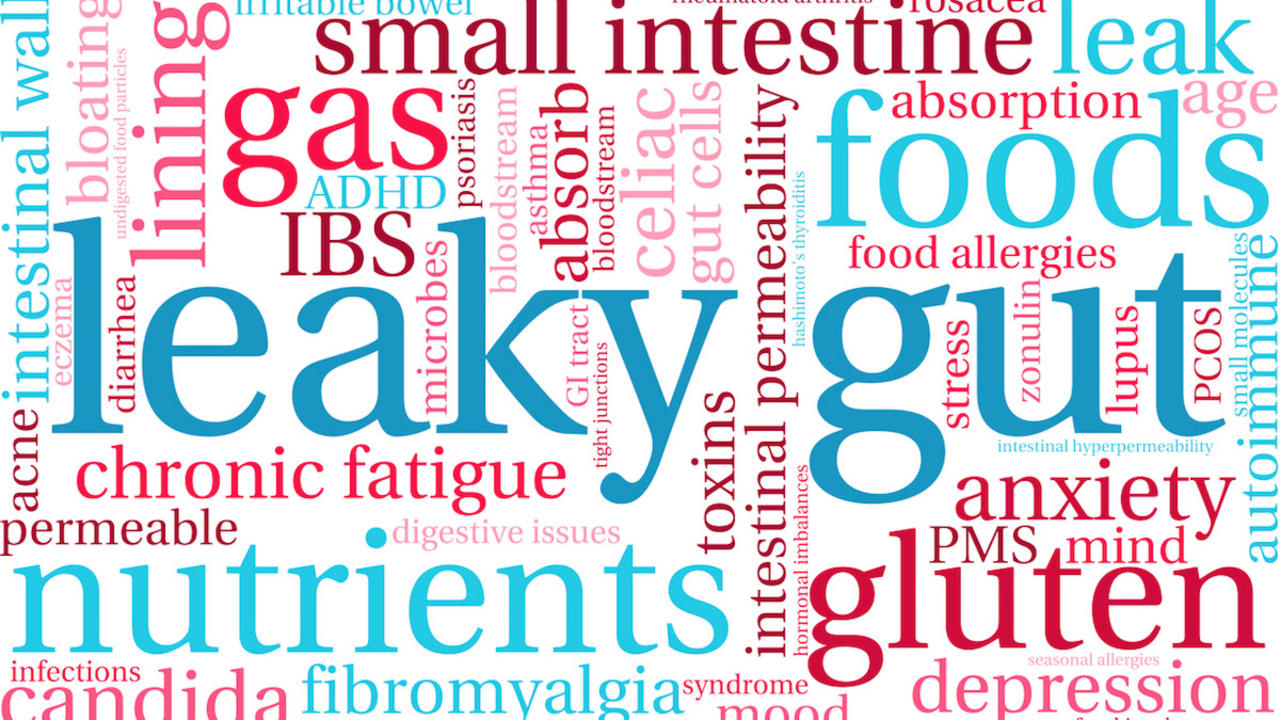Leaky Gut Syndrome | do I have leaky gut? how can I repair my leaky gut?

Leaky Gut Syndrome (or intestinal hyper-permeability) can occur when the microvilli in your gut, which controls what passes through the lining of your small intestine, are damaged. Undigested food particles, toxins, yeast and microbes can cross over into your bloodstream causing a host of symptoms including bloating, gas, diarrhea, constipation, abdominal cramps, food sensitivities, joint pain, fibromyalgia, mood swings, brain fog and depression.
The microvilli in your small intestine are easily damaged by the use of antibiotics (and other drugs), as well as the consumption of processed food, sugar, trans fats and food additives. There are also a variety of bacteria, viruses and parasites that can damage the delicate balance of your gut lining.
Your digestive system is comprised of a community of friendly bacteria that helps breakdown your food, process nutrients and protect your body from invading species. Without a healthy balance within your microbiome1, your body is left vulnerable to attack.
Q. Do I have leaky gut syndrome? What do I do?
Have an assessment done by a Naturopathic Doctor or Holistic Medical Doctor. Both of these specialists have been trained to help patients with Leaky Gut Syndrome. Once you have a diagnosis, seek the assistance of a Nutritionist to help you with specific nutritional recommendations.
Q. What can I do to help repair my gut?
Repairing your gut lining is a lengthy process. Often it takes years to get to the point of a health crisis and so, it can take many months to see a complete recovery. A rapid reduction in many of your symptoms can occur by removing inflammatory foods that proliferate your condition.
1. Remove all refined foods
Remove sugar, gluten, trans fats, preservatives and food colouring. In some cases, a complete removal of all grains, beans and legumes may be required. In extreme conditions, all complex carbohydrates (disaccharides and polysaccharides) may need to be removed until the gut heals. Raw foods could also be a problem at this time as they are more difficult to digest. Cooked or steamed foods, as well as warm, blended soups, may be the only foods that do not cause digestive upset – until your condition is healed.
2. Remove high-allergen foods
Foods, such as dairy and glutenous grains (i.e. wheat, corn and soy) are known to contribute to Leaking Gut Syndrome.
3. Have IgG & IgE blood testing done
IgG & IgE blood tests can help determine if you have developed antibodies to specific foods. These tests can be done through a Naturopathic Doctor or Holistic Medical Doctor.
4. Have candida and parasite stool testing done
If these microbes are present in high numbers, you will need to be treated for them in order for your gut to heal. These tests can be done through a Naturopathic Doctor or Holistic Medical Doctor, and they can also recommend treatments.
5. Include a daily probiotic supplement
Probiotics are beneficial live organisms, living in your gastrointestinal-tract that support digestion, facilitate immune defence, increase nutrient absorption and protect your gut from pathogens and parasites. I suggest rotating your probiotic supplement as there are a variety on the market, and a variety of bacteria. I recommend reviewing the ingredients (avoid dairy, corn, sugar, etc.) and asking about the source of the product. I have found this
particular product very effective for diarrhea.
6. Include Mandarin Skin + (MS+)
MS+ alleviates the symptoms of indigestion and promotes long-term digestive health by restoring your gut lining in response to stress. One of the most common sources of gut lining stress comes from properties that are not naturally found in the human system - such as alcohol and gluten. While protected in the gut, when these properties break through the lining and interact with the bloodstream and other organs, your body sees them as foreign and you feel pain and discomfort. MS+ repairs damaged cells and restores your gut lining.
7. Include a Vitamin D supplement
A 2015 study showed that a significant proportion of Irritable Bowel Syndrome sufferers are Vitamin D deficient.2 Vitamin D deficiency has been associated or implicated with the pathophysiology of gastrointestinal conditions, Inflammatory Bowel Disease and colorectal cancer, as well as with depression. Consider asking your medical doctor or Naturopathic doctor for a Vitamin D blood test to determine your level and if supplementation is warranted. I suggest including naturally fermented foods, such as sauerkraut and fermented carrots and radishes, in your daily diet. Purchased them in the fridge section of your local health food store, or make your own.
8. Include a high-quality Omega-3 supplement
Omega-3 fats, such as sustainable fish oil, help to heal your gut lining. For more information about healthy fats,
click here.
References
- Sarika Rohatgi, Vineet Ahuja, Govind K Makharia, Tarun Rai, Prasenjit Das, Siddharth Dattagupta, Veena Mishra, Sushil Kumar Garg: “VSL#3 induces and maintains short-term clinical response in patients with active microscopic colitis: a two-phase randomised clinical trial.” BMJ Open Gastro January 2015; 2:e000018 doi:10.1136/bmjgast-2014-000018
- Simon Tazzyman, Nicholas Richards, Andrew R Trueman, Amy L Evans, Vicky A Grant, Iveta Garaiova, Sue F Plummer, Elizabeth A Williams, Bernard M Corfe: “Vitamin D associates with improved quality of life in participants with irritable bowel syndrome.” BMJ Open Gastro December 2015; 2:e000052 doi:10.1136/bmjgast-2015-000052



